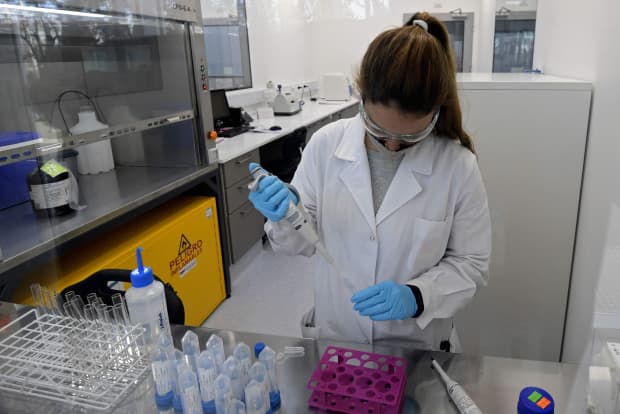This post was originally published on this site

A scientist works at the mAbxience biosimilar monoclonal antibody laboratory plant in Garin, Buenos Aires province, on August 14, 2020, where an experimental coronavirus vaccine will be produced for Latin America.
juan mabromata/Agence France-Presse/Getty Images
European stocks rose Monday, on hopes that the arrival of vaccines as early as next month will start to reverse the economic effects of the second wave of coronavirus.
Up 1.1% last week, the Stoxx Europe 600 SXXP, +0.38% rose 0.5%, led by travel plays including International Airlines Group IAG, +4.30% and oil producers such as Repsol REP, +4.73%.
The German DAX DAX, +0.77%, French CAC 40 PX1, +0.72% and U.K. FTSE 100 UKX, +0.26% each advanced.
Futures on the Dow Jones Industrial Average YM00, +0.71% rose 160 points. The S&P 500 SPX, -0.67% ended 0.8% lower last week.
U.S. hospitalizations for COVID-19 set a record for the 29th consecutive day on Sunday, according to the COVID tracking project. On a per-capita basis, Central European countries including Austria, the Czech Republic and Poland have the highest number of new cases.
More good news came on the vaccine front as AstraZeneca AZN, -1.87% AZN, +2.35% said a study found the vaccine it’s developing with Oxford University was up to 90% effective depending on the regimen. AstraZeneca shares fell 1.5%.
Pfizer PFE, +1.40% and Moderna MRNA, +5.21%, using a different technique, found their vaccines about 95% effective, and the U.S. may begin vaccinations the day after Food and Drug Administration approval, according to the head of Operation Warp Speed.
Investors also are watching the status of trade negotiations between the U.K. and the European Union. Politico reported that the European Parliament is preparing for an extra plenary session between Christmas and New Year’s Eve to give consent to a possible post-Brexit trade deal.

